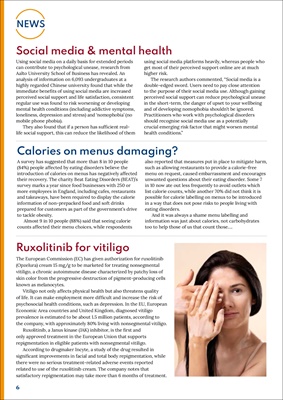
6
NEWS
Social media & mental health
Using social media on a daily basis for extended periods
can contribute to psychological unease, research from
Aalto University School of Business has revealed. An
analysis of information on 6,093 undergraduates at a
highly regarded Chinese university found that while the
immediate benefits of using social media are increased
perceived social support and life satisfaction, consistent
regular use was found to risk worsening or developing
mental health conditions (including addictive symptoms,
loneliness, depression and stress) and 'nomophobia' (no
mobile phone phobia).
They also found that if a person has sufficient reallife
social support, this can reduce the likelihood of them
using social media platforms heavily, whereas people who
get most of their perceived support online are at much
higher risk.
The research authors commented, "Social media is a
double-edged sword. Users need to pay close attention
to the purpose of their social media use. Although gaining
perceived social support can reduce psychological unease
in the short-term, the danger of upset to your wellbeing
and of developing nomophobia shouldn't be ignored.
Practitioners who work with psychological disorders
should recognise social media use as a potentially
crucial emerging risk factor that might worsen mental
health conditions."
Calories on menus damaging?
A survey has suggested that more than 8 in 10 people
(84%) people affected by eating disorders believe the
introduction of calories on menus has negatively affected
their recovery. The charity Beat Eating Disorders (BEAT)'s
survey marks a year since food businesses with 250 or
more employees in England, including cafes, restaurants
and takeaways, have been required to display the calorie
information of non-prepacked food and soft drinks
prepared for customers as part of the government's drive
to tackle obesity.
Almost 9 in 10 people (88%) said that seeing calorie
counts affected their menu choices, while respondents
also reported that measures put in place to mitigate harm,
such as allowing restaurants to provide a calorie-free
menu on request, caused embarrassment and encourages
unwanted questions about their eating disorder. Some 7
in 10 now ate out less frequently to avoid outlets which
list calorie counts, while another 70% did not think it is
possible for calorie labelling on menus to be introduced
in a way that does not pose risks to people living with
eating disorders.
And it was always a shame menu labelling and
information was just about calories, not carbohydrates
too to help those of us that count those….
Ruxolitinib for vitiligo
The European Commission (EC) has given authorization for ruxolitinib
(Opzelura) cream 15 mg/g to be marketed for treating nonsegmental
vitiligo, a chronic autoimmune disease characterized by patchy loss of
skin color from the progressive destruction of pigment-producing cells
known as melanocytes.
Vitiligo not only affects physical health but also threatens quality
of life. It can make employment more difficult and increase the risk of
psychosocial health conditions, such as depression. In the EU, European
Economic Area countries and United Kingdom, diagnosed vitiligo
prevalence is estimated to be about 1.5 million patients, according to
the company, with approximately 80% living with nonsegmental vitiligo.
Ruxolitinib, a Janus kinase (JAK) inhibitor, is the first and
only approved treatment in the European Union that supports
repigmentation in eligible patients with nonsegmental vitiligo.
According to drugmaker Incyte, a study of the drug resulted in
significant improvements in facial and total body repigmentation, while
there were no serious treatment-related adverse events reported
related to use of the ruxolitinib cream. The company notes that
satisfactory repigmentation may take more than 6 months of treatment.